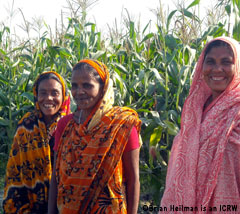
Income isn’t everything
Media Contact
Whether you translate it as “discussion,” “debate,” or just plain “gossip,” there is no doubt that adda is among the most beloved pastimes of Bengalis around the globe. In its most idealized form, adda is a flurry of passionate philosophy, argument and interruption among poet-revolutionaries gathered over cups of tea. Certain influential addas from the last century are even acknowledged as inspiration for the political philosophies behind the independence movements of both India and Bangladesh.
Yet as a student of Bengal and the Bengali language, I’ve always been drawn to an adda of a different kind: the adda of women gathered together, speaking their minds. It may not claim any paragraphs in history textbooks, but in village Bengal this adda is as influential as the rain.
It happens around the pond while washing clothes, around a table while rolling chapattis, around a quilt while stitching old saris together to make a kantha blanket. Let’s call it “appas’ adda,” using the affectionate title (appa is literally “big sister”) that Bangladeshi women often go by.
 Back when I lived in rural Bengal, I tried as often as possible to participate in appas’ adda, usually letting it start with women teasing me for how oblong my chapattis were, or how crooked my kantha stitching. As a man, it was sometimes awkward to enter this space. But modeling new social norms by definition requires a comfort with awkwardness, and it was always while kindly listening to these women’s conversations that I felt I best understood the state of life in my village. How lucky for me and how wise for ICRW’s programming, then, that I returned to rural Bengal recently to convene appas’ adda (“focus group discussions” in research parlance) on women’s economic empowerment.
Back when I lived in rural Bengal, I tried as often as possible to participate in appas’ adda, usually letting it start with women teasing me for how oblong my chapattis were, or how crooked my kantha stitching. As a man, it was sometimes awkward to enter this space. But modeling new social norms by definition requires a comfort with awkwardness, and it was always while kindly listening to these women’s conversations that I felt I best understood the state of life in my village. How lucky for me and how wise for ICRW’s programming, then, that I returned to rural Bengal recently to convene appas’ adda (“focus group discussions” in research parlance) on women’s economic empowerment.
In villages near Bogra, my colleagues and I gathered and listened to groups of women pursuing gender norm-defying economic roles for themselves, such as cultivating corn or collectivizing to export woven baskets. The women explained how they began these activities, how they felt about participating and how their lives changed as a result.
Like much of ICRW’s research, the insights these conversations provided defy simplistic conclusions. Whereas one woman confidently proclaimed that the income from selling baskets increased her household power and ability to pay her daughter’s school fees, a fellow weaver shared that her household influence suffered greatly since her husband took a second wife. Even though our research focused on economic changes in women’s lives, their experiences reinforced that earning an income isn’t everything. They told us that being able to go wherever they want, getting an education and being economically secure are equally vital indicators of a woman’s “empowerment.”
At the conclusion of one conversation, an elder member of the group moved her chair to the center of the circle and sang a local folk song for her peers and visitors. Her voice was rich and complex, lamenting in tone but undeniably confident in delivery. Here was a leader, I realized. Here was a role model, here was a voice (that frequent metaphor for power), and none of us needed a survey questionnaire or list of indicators to know that we were in the presence of empowerment.
In the crowd I heard the soft but eager voices of other women, humming along with the words of the song, envisioning that day when they, too, would step forward and sing.
